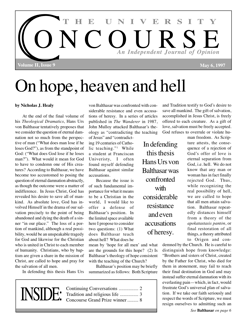In defense of Noelle Hiester
by Cat Clark
I am writing in response to the articles by Fr. Giles Dimock and Alicia Hernon in the March 27 issue of the Concourse. Since I have no illusion that the Latin Rite is the only one in the Catholic Church (those who know me, including Fr. Giles, know that I especially enjoy Eastern liturgies and
devotions), no one can accuse me of shunning diversity. The catholicity of the Church was one of the chief reasons I became a Catholic. And yet I intend to defend Noelle Hiester.
Ignoring Hiester’s quotation from Inaestimabile Donum, which is the essence of the debate, Fr. Giles instead speculates about the article’s motives. He implies that she accused the campus priests of laziness, though her article said nothing like that. Hiester also did not protest the offering of Communion under both species; rather, she proposed that we be willing to sacrifice a little more of our time for Christ.
When I was an Episcopalian, there were never more than three ministers of the eucharist at the cathedral I attended, yet we always received under both species, and it never took an “excessively long” amount of time. The services were typically shorter than the Sunday liturgies here.
My conclusion, therefore, is not to assume that Hiester opposes communion under both species or that she demands that all priests be present for all liturgies. She seems only to be saying that all Catholics should be willing to give up time for the sake of obedience, which is clearly based on biblical principles (Luke 9:23-24) and hardly controversial, much less “sectarian” or “legalistic.” Alicia Hernon’s article on the subject also contains flawed argumentation. Hernon says, “I see no place where the Church says extraordinary ministers cannot be used regularly, therefore I see no abuse.” But in Roget’s Thesaurus, “extraordinary” is listed as synonymous with “irregular, uncommon, unusual, and un-customary.” “Regular” is synonymous with “ordinary, common, frequent, and customary.” One would be hard-pressed to choose two more opposed words. Surely the Church meant something particular in using the term “extraordinary”?
It may be “arrogant” to say “I know how the Church should be run,” but is it arrogant to say that the Church does, and has directed her members—lay and religious—accordingly?
Finally, I find it striking that the March 27 articles which argue that Hiester’s tone was judgmental contain so much ad hominem argument. Fr. Giles’ article uses words like “divisive” and “sectarian” to describe Hiester and others, and Hernon’s article calls Hiester arrogant, disrespectful and legalistic. Can’t we avoid personal accusation and discuss the issues themselves?
Cat Clark, Senior theology major


